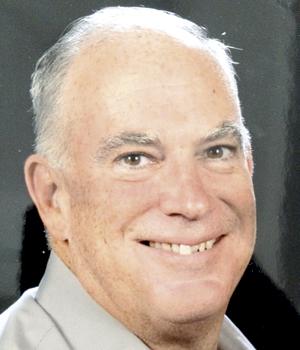You can talk about the weather, but not the climate
In 2011, climate scientist David Goodrich hopped on his bike at Cape Henlopen State Park, Lewes, and began a 4,200-mile journey to Waldport, Oregon.
His goal: to see "what changes in the climate system looked like on the ground." He has turned the trip into a new book, "A Hole in the Wind: A Climate Scientist's Bicycle Journey Across the United States."Goodrich, former head of NOAA's Climate Observations and Monitoring Program, recorded both his observations and the observations of others.
He hadn't traveled far when he discovered that, as he put it, "you could talk about the weather, but not about the climate."
Not even in low-lying, wave-lapped Delaware, where a sober, clear-eyed assessment of our risks might seem especially important.
Stopping at Prime Hook National Wildlife Refuge near Milton, Goodrich asked a volunteer, "Are you seeing sea level rise?"
"I don't know about that," he was told, "but the bay has moved in ... what's killing us is the flood insurance." Note the odd, perhaps unintended, deflection. The problem's not sea - or bay - level rise. It's the flood insurance. Can't imagine why it's getting so high.
Allan Fallow's review of Goodrich's book in the July 16 Washington Post called to mind Geary Foertsch's column in the July 11 Cape Gazette, which applauded President Trump's withdrawal from the Paris Climate Accord. That decision left the U.S. as one of three countries, along with Syria and Nicaragua, not part of the agreement.
In his announcement, Trump said, "The United States will cease all implementation of the non-binding Paris Accord and the draconian financial and economic burdens the agreement imposes on our country." What bizarre thinking! He called the accord both "non-binding" and "draconian."
Foertsch's main points, it seemed, were to dismiss both warnings of climate change and also the possibility that wind and solar power could play a meaningful role in meeting our energy needs.
Regarding the former issue, Foertsch pointed to Joe Biden's recent purchase of a house near Cape Henlopen State Park. He questioned why - if sea level rise represented such serious dangers - Biden would take such a risk.
Please. Biden's 74 years old. He's taking the same risk a lot of us are taking. We love living near the coast even as we recognize the consequences of climate change will fall mainly on younger and future generations. That's hardly a reason to ignore the incoming tidal wave of scientific evidence.
Foertsch also quotes State Climatolgist Dan Leathers' estimate for sea level rise, over the next century, of 13 inches.
Which might not sound like much and, yes, is lower than some of the more extreme scenarios he listed.
He did not mention Leathers' following quote.
"A foot of sea-level rise is pretty darn important when you have many roads in Delaware that flood every time there's a full moon and a high tide," he said. "You add a foot onto that, and it becomes a big deal." (Cape Gazette, Sept. 5, 2016.)
Sea level rise is already a big deal to places like the DuPont Nature Center near Milford.
A TripAdvisor review recommends a visit but warns motorists: "At high tide during a northeast wind you may not be able to get there because the Bay rises and covers the road at times." This nature center opened only 10 years ago, and it's already having problems with accessibility.
Foertsch also claims wind and solar power are in insufficient to meet our energy needs. By themselves, that may be true, but consider these advances:
• In 2008, Iowa used wind power to generate 7.7 percent of its electricity. That figure has now climbed to 35 percent.
• According to a May 17 Inside Energy story, North Dakota, a decade ago, generated a measly 2 percent of its electricity from wind power. Wind turbines now supply 20 percent of the state's electricity.
We are making progress. In grade school back in the '60s, I learned America was the "land of inventions."
Back then, I - and the rest of the world - thrilled to America's greatest display of scientific and technical prowess: the race to the moon. We're facing a far different race today. We're racing - or should be - to save our planet even as we adapt to sea level rise.
Don Flood is a former newspaper editor living in Lewes. He can be reached at floodpolitics@@gmail.com.





















































